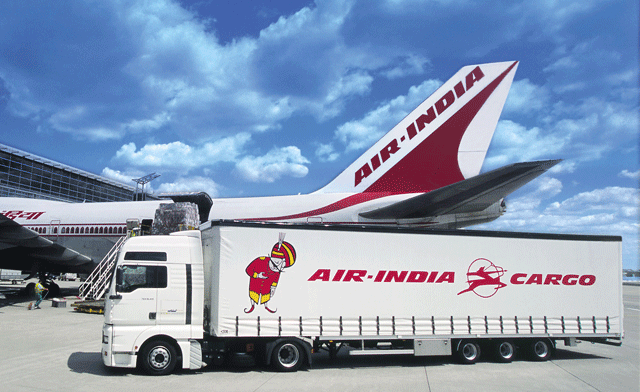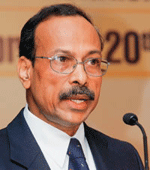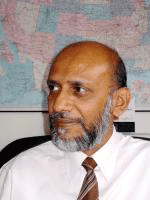Air
India Chief Building Change

 India’s
national carrier is on the upswing. India’s
national carrier is on the upswing.
Under the leadership of V Thulasidas, Air
India’s chairman and managing director, Air India has planned out
a slew of measures, from a planned IPO, to expanding its network, upgrading
its fleet and providing better facilities to passengers and enhancing
air cargo service.
The driving force for change is the aforementioned
V. Thulasidas who has gained something of a reputation as manager extrordinaire,
having served as chief secretary of Tripura for many years.
Air India is reading its IPO having appointed
Merrill Lynch as advisors with a report expected by the end of the year.
The IPO will “change the very character”
of the airline and is intended to correct the debt-equity structure of
the company.
Air India is also expected to commence fuel
hedging.
Apart from the Maharaja, one of the oldest
brand images of the Indian corporate sector that will remain untouched,
a subtle but definite change includes almost everything else as the carrier
begins its seventy-fourth year.
Now the hyphen in the Air India logo is
gone as other changes abound at the carrier.
V Thulasidas is telling employees and the
world alike that Air India “must improve productivity.”
"There is an urgent need for all of
us to enhance our product quality, revenue earnings and manpower productivity,
so that the cost advantages that we suffer are neutralized to the maximum
possible extent."
What Mr. Thulasidas is about is expanding
a small airline into a large one.
“We are doubling the size of Air India
in three years, both by acquisition and leasing of aircraft.
“Our goal is to be one of the top
five airlines in Asia in the next five years.
“To do this we have to think global.”
The Air India Board approved, adding aircraft
to the fleet based on an annualized capacity growth of 12 percent.
Due to commence delivery in 2006 are eight
B777-200LR medium capacity, ultra long range aircraft and fifteen B777-300ER
medium capacity long range aircraft and later twenty seven B787 medium
capacity long range aircraft.
Also slated to join the fleet are eighteen
B737-800 aircraft for Air India Express, the carrier’s low-cost
entry.
Additionally, to counter the competition
and the increase in the number of international fliers, Air India has
increased its flights substantially to major destinations.
“We have already doubled our flights
to the U.S.,
to serve more cities and have resumed flying
to Toronto, Canada (Toronto/Birmingham/Amritsar/New Delhi).
“Air India will fly to more destinations
in Europe while ramping up operations again from Kolkata to London, and
increasing the Mumbai-London and Delhi-London sectors.”
Already flights from UK to India have moved
up going from ten weekly frequencies a couple years ago to 24 frequencies
this past summer.
Connections to Australia will begin in 2006/2007
after the first batch of new aircraft arrives.
“We are looking at a non-stop operation
with hubbing over Mumbai, largely for the UK-bound traffic, or with one
stop flights via Singapore.
“There are 1.25 million Australians
traveling into UK every year,” Mr. Verma said.
Air India currently operates flights from
Mumbai and 12 other Indian cities: Ahmedabad, Amritsar, Bangalore, Chennai,
Delhi, Goa, Hyderabad, Kochi, Kolkata, Kozhikode, Lucknow and Thiruvananthapuram.
Having taken care of the fleet, the Air
India chief has chalked out a plan to offer e-customer services, even
Japanese meals on the India-Japan route.
Air India has increased its market access
through code-sharing arrangement with other international carriers.
Air India’s code-share services are
now available for these sectors:
In Europe: Paris-Amsterdam/Berlin/Frankfurt,
Geneva, Moscow, Vienna and Zurich. In UK: London-Delhi-London; In USA
& Canada: Kuala Lumpur-Los Angeles-Kuala Lumpur, Singapore-Los Angeles-Singapore
and Seoul-San Francisco-Seoul; In Asia Pacific: Bangkok,Bangalore/Hyderbad/Mumbai-Kuala
Lumpur, Kochi-Singapore-Kochi, Hyderabad-Singapore-Hyderabad; In the Gulf
& Middle East: Dubai-Chennai-Dubai, Dubai-Kochi- Dubai, Kuwait-Thiruvanathapuram-Kuwait,
Kuwait-Chennai-Kuwait and Kuwait-Kochi-Kuwait; Mauritius; Africa and,
in Korea: Seoul.
Air India’s first flight on October
15, 1932 is quintessential even today.
V Thulasidas is emphatic on this point:
“Growth will be our key to future
success.”
T Ghosh
The
Air India Maharajah Remains An Endearing Icon
|
 He
has now spanned the centuries, having worked for an airline longer
than any man in history. He
has now spanned the centuries, having worked for an airline longer
than any man in history.
Of all the airlines,
on all the runways, in every city and town across every country and
continent, in the air, everywhere in the world today, he is the most
recognized aviation character in history.
In
2005, he completes 58 years of antics, expressions and puns that have
allowed an airline company to promote its services with a unique panache,
and an unmatched sense of subtle humor.
He is
the Air India Maharajah.
"We originally
called him a Maharajah for want of a better description, and the name
just stuck.
"But his blood isn't blue.
“He may look like royalty, but he isn't royal
at all in style or substance."
Bobby Kooka,
the man who conceived the cartoon Air India Maharajah in 1946, said.
"The Maharajah was created in fun for an on
board memo pad."
The figure first made
his appearance for Air India, when Mr. Kooka, then
serving as Air India's commercial director and Umesh Rao, an artist
with J.Walter Thompson Ltd., Mumbai, together created the Maharajah.
The Maharajah debuted as a rich Indian potentate, symbolizing
graciousness and high living.
|
Along the way as the
figure caught on, his creators added some touches toward developing
his distinctive
personality including an outsized moustache, the striped turban and
his aquiline nose.
Today, this sometimes naughty,
but always nice, if slightly diminutive Maharajah of Air India, is
better known in some parts of the world than Mickey Mouse.
The
Maharajah is viewed in Air India promotional duties as a lover boy
in Paris, a sumo wrestler in Tokyo, a pavement artist, or even as
a monk.
Most recently as described here, he
is seen overlooking the" Hollywood" sign from a director’s
chair as Air India launched Los Angeles/Mumbai service.
He
gets away with just about anything with a smile, because he is the
Maharajah!
On the serious side, the Maharajah
has won numerous national and international awards for Air India for
originality in publicity.
But the Maharajah
has critics.
"There is no more royalty
in India," say some. "All the kingdoms have been taken down,
so why should that figure represent the airline?” is another.
But millions of travelers, whose lives have been
touched by the welcoming icon, think of the Maharajah with his inimitable
style, charm and wit as a very real person.
"People
just like him around," said Ralph Thomas at Liberty Travel in
New York.
"The Maharajah is a calming positive
influence, that is as relevant today as in years gone by.
“He
is a legend who makes people feel good about a great airline." |
|
|
The
Secret Of Nim
 With
service from Los Angeles and Toronto added to Chicago, Newark and New
York , Air India Cargo is building new friends amongst air shippers across
North America and Canada. Air India is providing a daily service to India
from its four US gateways Los Angeles, Chicago, Newark and New York. With
service from Los Angeles and Toronto added to Chicago, Newark and New
York , Air India Cargo is building new friends amongst air shippers across
North America and Canada. Air India is providing a daily service to India
from its four US gateways Los Angeles, Chicago, Newark and New York.
Overshadowed at one time by other carrier’s
bells and whistles, Air India Cargo is now no longer a secret, according
to Dalip Nim, AI Cargo Sales Manager North America. Today, Air India is
a viable belly cargo carrier catering to the needs of the cargo market
in USA and Canada.
“We launched our first U.S. West coast service,
with thrice weekly frequencies between Los Angeles, Frankfurt and Mumbai
(Bombay) a year ago this past June. Now we operate COMBI service to Delhi
via Frankfurt every Monday, Wednesday, Saturday and Boeing 744 service
to Bombay via Frankfurt every Tuesday, Thursday, Friday and Sunday."
“We also now serve Toronto with service
thrice weekly via Birmingham with combination passenger/cargo service.
Toronto is a growing market that will continue
to develop and provide Air India ample opportunity to service the cargo
customers."
Air-India flights between India-USA are direct
and do not involve change of aircraft at a transit point, as is the case
with flights operated by other airlines.
Air India flies daily from East Coast - JFK-LHR-DEL-BOM
and EWR-CDG-BOM-AMD.
“Air cargo shall emerge as a major contributor
to Air India's operations in USA and Canada.
Shippers in the U.S. Region and Canada are increasingly
realizing the advantage of a direct route from the USA and Canada to India,
aboard our wide bodied cargo-friendly Boeings," Mr Nim added.
Actually air cargo has been a driving force at
the carrier since the very beginning when freight helped launch the airline
itself.
Air-India operated its first cargo flight carrying
postal mail from Karachi to Mumbai (Bombay) via Ahmedabad on October 15,
1932 with J.R.D. Tata, the airline founder in command of a tiny De Havilland
Puss Moth DH-85 aircraft that flew at less than 1,000 feet off the deck
at 100 miles per hour over a range of 700 miles.
That flight is recorded in history as birth of
the airline.
Delivering cargo since 1932, today Air-India Cargo
carries just about everything.
From emeralds to elephants, pins to pigments,
shrimps to super computers and other high tech goods and clothing, the
airline, one of the oldest in the world is building a solid reputation
as India’s economy booms.
“Air-India Cargo now offers a same-plane
capacity advantage from Newark, New York, Chicago, Los Angeles and Toronto
directly to India, where our service interfaces with a global network,"
Mr. Nim assures.
“In India, for example we fly to Mumbai
(Bombay), Delhi, Chennai (Madras), Thiruvananthapuram, Hyderabad, Bangalore,
Kolkata, Ahmedabad, Goa, Kochi, Kozhikode and Lucknow.
To support cargo operations, we have a highly
skilled and experienced team of professionals.
At our warehouse in Mumbai, Air India cargo has
developed a seamless IT system that handles inventory management, as well
as cargo import/export functions including electronic data interface (EDI)
with Indian Customs.”
The Air India operations at Los Angles is headed
by Mr Lalit Kapur, Manager-West Coast and at Toronto by Mr RB Chopra,
Manager-Canada.
Dalip Nim has worked in every single aspect of
the airline business at Air India since joining the carrier in 1980.Prior
to landing at Cargo Building 86 at JFK International Airport in New York,
where he is currently based, Mr. Nim, now an all-cargo pro, served as
District Cargo Sales Manager in Delhi.
Mr.Nim's message to the business partners is "Your
Commitment, Our Service; Your Satisfaction, Our Goal. Air India shall
provide personalized, dedicated, dependable and cost effective service
to its customers. We at Air India believe in maintaining lasting and productive
relationship with our business partners."
|



